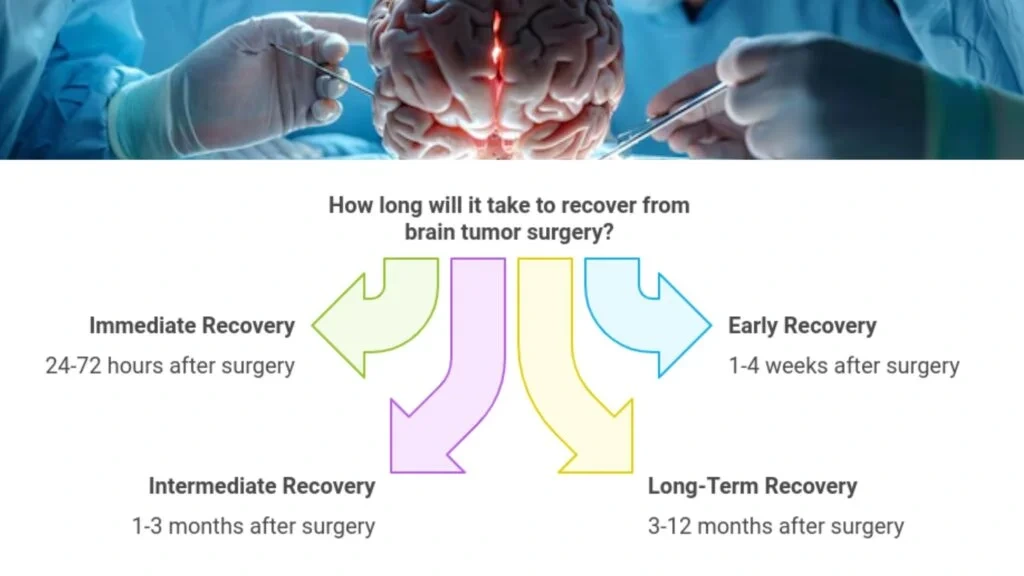Brain tumor surgery is a sensitive and complicated process that often includes removing or lowering the size of a tumor in the brain. Whether the tumor is benign or malignant, surgery is just the beginning of the treatment procedure. Brain tumour operation recovery time varies greatly depending on the patient’s general health, the location of the tumour, and the kind of treatment done. In this article, we will look at the phases of recovery after brain surgery and the elements that impact the brain surgery recovery time.
If you are contemplating brain tumor surgery or seeking recovery advice, it is important to understand the various phases of recovery and possible problems. For individuals in Hyderabad, seeing the best neurosurgeon, such as Dr. Raveesh Sunkara, at the best neurosurgery hospital in Hyderabad, may have a substantial influence on your treatment and recovery.
Stages of Brain Tumor Surgery Recovery

1. Immediate Postoperative Stage (First 24-72 hours)
The early period after brain surgery is essential since patients are intensively watched in the Intensive Care Unit (ICU). During this time, the medical team monitors vital signs, brain function, and any consequences, including bleeding or infection. You may suffer tiredness, disorientation, or headaches in the first few days after brain surgery recovery.
Key things to expect:
Swelling and discomfort: Following surgery, the brain may swell, resulting in transient neurological brain tumor symptoms such as difficulties speaking, visual issues, or limb paralysis.
Pain management: The medical team will provide drugs to alleviate pain and discomfort.
Neurological tests: Regular tests will examine brain function and guarantee appropriate healing.
2. Early Recovery Stage (First 1-4 weeks)
As you leave the ICU, the early recovery phase starts. Depending on the intricacy of the procedure, you may be in the hospital for many days or weeks. During this brain surgery recovery time frame, the brain begins to repair, although weariness, weakness, and a sluggish return to normal functioning are frequent symptoms.
Cognitive recovery: Cognitive processes such as memory and focus may need some time to return to normal. Some patients say they feel cognitively hazy or quickly exhausted.
Physical treatment: If the operation impairs motor capabilities, physical therapy will be an essential element of the rehabilitation process. Regular exercise and therapy are essential for restoring strength and coordination.
Follow-up Care: Regular follow-up sessions with the best neurosurgeon in Hyderabad, are necessary to monitor your progress. The surgeon will also examine the pathology data to determine the type of the tumour.
3. Intermediate Recovery Stage (1–3 Months)
At this point, many patients begin to recover their independence. You may be released from the hospital and continue to recuperate at home. While you may be able to resume mild activities, it is critical to avoid excessive physical activity and allow the brain to recover.
Cognitive and emotional healing: Because the brain is involved in emotion regulation, emotional disturbances such as anxiety, mood swings, and sadness are not uncommon. Cognitive rehabilitation treatment may assist with these challenges.
Return to work: Depending on the nature of employment, some patients may be able to return to their occupations during this time, although changes may be required to accommodate tiredness or other residual symptoms.
4. Long-Term Recovery Stage (3–12 Months)
The long-term recovery after brain surgery period might last up to a year, during which the brain continues to mend. By this point, many patients have made considerable improvements, while others may still have symptoms.
Long-term complications: Depending on the location of the tumour and the depth of surgery, some people may have lasting alterations. Changes in speech, mobility, or vision, for example, may be permanent.
Life After Brain Tumor Surgery: Living a regular life after brain surgery is feasible; however, certain adaptations may be required. Many patients eventually resume their old activities and, with the proper medical care, enjoy satisfying lives.
Factors Affecting Brain Tumour Operation Recovery Time
Several variables may impact how fast or slowly a patient heals after brain tumour surgery. These factors include:

1. Type of Tumor
Benign tumours often have a better prognosis and a quicker recovery period than malignant ones. Benign brain tumor surgery recovery often has fewer difficulties, although each case is unique.
2. The location of the tumor
The tumour’s location in the brain has a substantial impact on healing. Tumours in important regions, such as those that regulate movement, speech, or vision, may impair recovery and require longer rehabilitation times.
3. Patient Age and Health Status
Older patients or those with pre-existing problems may take longer to recover. Good physical health before surgery is generally associated with a speedier recovery.
4. The extent of surgery
The intricacy of the procedure influences recuperation time. A total tumour resection may need a lengthier recovery time than a partial resection, particularly if sensitive parts of the brain are affected.
5. Post-Surgical Complications
Infections, oedema, and bleeding are all potential problems that might cause a delay in recovery after brain surgery. To avoid problems, you must follow your doctor’s recommendations and report any unexpected symptoms at once.
Get Specialized Care with Dr. Raveesh Sunkara
If you or a loved one has been diagnosed with a brain tumour, selecting the correct medical team may significantly improve recovery prospects. Dr. Raveesh Sunkara, one of the finest neurosurgeons in Hyderabad, performs specialist brain tumour surgery at the best hospital for brain tumor in India, which is equipped with cutting-edge equipment and a caring care staff. Are you ready to take the next step? For professional guidance and thorough brain tumour treatment, contact Dr Raveesh Sunkara today!
FAQs
How long will it take to recover after brain tumour surgery?
The brain tumor surgery recovery time varies according to the kind of surgery, the patient’s health, and the location of the tumor. The first healing period often lasts 1-3 months. However, complete recovery might take a year or more.
What is the healing time after a benign brain tumour surgery?
When opposed to malignant tumors, benign brain tumor surgery often results in a speedier recovery. Most people start feeling better after 1-3 months. However, complete recovery may take longer, depending on individual conditions.
Can I resume regular activities after brain surgery?
Yes, many people resume regular activities after brain surgery. However, the chronology varies. Light activities usually resume after a few weeks, but more intensive duties or returning to work may take longer.
What can I anticipate in terms of life following brain tumour surgery?
Life following brain tumour surgery may need some modifications, but many patients reclaim their prior quality of life. Continued therapy, frequent follow-ups, and assistance from healthcare specialists are critical components of a full recovery.
How can I speed up my recovery after brain surgery?
Follow your doctor’s instructions, attend all follow-up visits, participate in appropriate physical and cognitive therapy, and live a healthy lifestyle. Staying patient and cheerful is also vital for total recovery.







